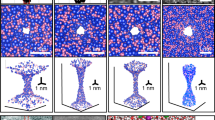Abstract
THE diffusion of an electro-oxidizable or -reducible substance in solution can be studied by measuring the current obtained using suitable electrodes in an electrolysis cell under such conditions that the amount of electro-oxidizable or reducible material reaching one of the electrodes is determined only by the rate of diffusion of the material to the electrode. The concentration of the diffusing material at the electrode is maintained at a value practically equal to zero by applying a potential to the electrode such that the diffusing material is immediately oxidized or reduced upon reaching the electrode surface.
This is a preview of subscription content, access via your institution
Access options
Subscribe to this journal
Receive 51 print issues and online access
$199.00 per year
only $3.90 per issue
Buy this article
- Purchase on Springer Link
- Instant access to full article PDF
Prices may be subject to local taxes which are calculated during checkout
Similar content being viewed by others
References
Cottrell, F. G., Z. phys. Chem., 42, 385 (1902).
MacGillavry, D., and Rideal, E. K., Rec. Trac. chim., 56, 1013 (1937).
Author information
Authors and Affiliations
Rights and permissions
About this article
Cite this article
LAITINEN, H., KOLTHOFF, I. Study of Diffusion Processes by Electrolysis with Micro-electrodes. Nature 144, 549–550 (1939). https://doi.org/10.1038/144549a0
Issue Date:
DOI: https://doi.org/10.1038/144549a0
Comments
By submitting a comment you agree to abide by our Terms and Community Guidelines. If you find something abusive or that does not comply with our terms or guidelines please flag it as inappropriate.



